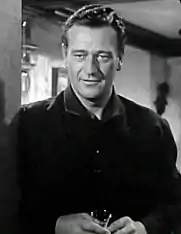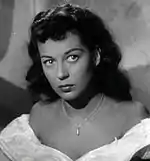Wake of the Red Witch
Wake of the Red Witch is a 1948 American adventure film directed by Edward Ludwig and starring John Wayne, Gail Russell, Gig Young, Adele Mara, and Luther Adler. Produced by Edmund Grainger, it is based upon the 1946 novel of the same name by Garland Roark. The film was distributed by Republic Pictures. Rare for a film produced by Republic Pictures, Wake of the Red Witch is an A movie that had a relatively high budget for its production, later becoming one of Republic Pictures' most successful releases.[3]
| Wake of the Red Witch | |
|---|---|
 Theatrical release poster | |
| Directed by | Edward Ludwig |
| Produced by | Edmund Grainger |
| Screenplay by | Harry Brown Kenneth Gamet |
| Based on | Wake of the Red Witch by Garland Roark |
| Starring | John Wayne Gail Russell Gig Young Adele Mara |
| Music by | Nathan Scott |
| Cinematography | Reggie Lanning |
| Edited by | Richard L. Van Enger |
Production company | Republic Pictures |
| Distributed by | Republic Pictures |
Release date |
|
Running time | 106 minutes |
| Country | United States |
| Language | English |
| Budget | $1,200,343[1] |
| Box office | $2.1 million[2] |

John Wayne stars as a sea captain in the early 1860s East Indies out for revenge against a wealthy shipping magnate.
Plot
The film is about an ongoing rivalry between two men of the sea: Mayrant Sidneye (Luther Adler) owner of the shipping company Batjak Limited, and Captain Ralls (John Wayne).
The first part of the film depicts Captain Ralls as the ruthless master (captain) of the Red Witch, Batjak's flagship. For reasons not entirely clear, Ralls deliberately wrecks and sinks the Red Witch and its cargo of gold bullion worth five million dollars. He escapes a charge of barratry when Batjak unexpectedly withdraws its complaint.
Ralls and his first mate Sam Rosen (Gig Young) spend some time as fishermen on a schooner. They eventually follow a treasure map to an uncharted island. They are greeted on the island by Sidneye, the map turning out to be a ploy to lure Ralls to the island so Sidneye can deal with Ralls in his own way.
The film then uses a series of flashbacks to describe how Ralls and Sidneye first met and how Ralls became captain of the Red Witch. Specifically, it is revealed that both Ralls and Sidneye fell in love with the same beautiful woman, Angelique (Gail Russell). When Ralls accidentally killed Angelique's uncle, Angelique married Sidneye even though Ralls is the man she really loved. However, when Angelique became ill and was dying, she somehow got word to Ralls and he returned to the island. Angelique dies in his arms soon after he arrives. It is strongly hinted that Ralls's deliberate sinking of the Red Witch was an act of revenge against Sidneye for depriving him of the woman he loved.
After the flashbacks the film returns to the present. Ralls and Sidneye strike a deal in which Ralls will reveal the exact location of the wreck of the Red Witch in exchange for a portion of the gold recovered from it. But when the salvage operation is to begin, it is discovered that the wreck is resting precariously on an underwater ledge, half on the ledge and half hanging over deeper water, making salvage extremely dangerous. Ralls is the only one willing to take the risk. He dives down to the wreck and manages to get a portion of the gold back up to the surface. But then the wreck begins to slide off the ledge. Falling debris traps Ralls inside the wreck, and he dies after the descending wreckage severs the hose supplying him with air.[4][5]
Cast
- John Wayne as Captain Ralls
- Gail Russell as Angelique Desaix
- Gig Young as Sam Rosen
- Adele Mara as Teleia Van Schreeven
- Luther Adler as Mayrant Ruysdaal Sidneye
- Eduard Franz as Harmenszoon Van Schreeven
- Grant Withers as Captain Wilde Youngeur
- Henry Daniell as Jacques Desaix
- Paul Fix as Antonio "Ripper" Arrezo
- Jeff Corey as Mr. Loring
- Duke Kahanamoku as Ua Nuke
- Dennis Hoey as Capt. Munsey
- Erskine Sanford as Dr. van Arken
- John M. Pickard as Second Diver (uncredited)
- James Dime as a seaman[6]
Original novel
The novel was published in 1946. It was written by Garland Roark, a Texan who worked in advertising.[7][8] The Washington Post called it "a smashing melodrama."[9] The book became a best seller[10] ultimately selling over a million copies.[11]
Development

Republic Films paid $100,000 for the screen rights to the book, reportedly the most money that studio had ever paid. (Traditionally Republic focused on making medium and low budget Westerns and serials.) Edmund Grainer was assigned the job of producing. John Wayne, the studio's biggest star, was always discussed as a possible lead. Charles Laughton was also mentioned as possible casting.[12][13]
The movie was part of an attempt by Herbert Yates, head of Republic, to increase the prestige of the studio's output. Other films around this time made by the studio include Orson Welles' version of Macbeth and The Red Pony starring Robert Mitchum.[14] Wake of the Red Witch was to be a "deluxe" production, and was given one of the highest budgets in Republic's history.[15]
The budget was originally $1.8 million but this was reduced to $1.5 million then $1 million.[16]
Production

Wake of the Red Witch represented the second screen teaming of John Wayne and Gail Russell, after Angel and the Badman the previous year, during which he and Russell allegedly had an offscreen affair, a claim which both Wayne and Russell denied; the film must also have held some special significance for Wayne, since he named his own production company, Batjac, after the shipping firm depicted in the picture named "Batjak".[17] Wayne's secretary misspelled it as Batjac on the corporation papers, and Wayne let it stand.
Wake of the Red Witch shares similarities in both character and climax to a similarly titled earlier John Wayne sea picture, Cecil B. DeMille's Reap the Wild Wind released six years earlier, but this film has a more direct approach in exploring the complex motivations of its characters.
Filming started in July 1948.[18] The island scenes were shot at Rancho Santa Anita, formerly owned by Lucky Baldwin, with sea footage shot at the Isthmus on Catalina Island. Underwater scenes meant extensive work was done in post production.[19]
Restoration
A new restoration of Wake of the Red Witch by Paramount Pictures, The Film Foundation, and Martin Scorsese premiered at New York City's Museum of Modern Art (MoMA) on August 9, 2018. The screening was part of the museum's program of showcasing 30 restored films from the library of Republic Pictures curated by Scorsese.[3]
See also
References
- Flynn, Charles; McCarthy, Todd (1975). "The Economic Imperative: Why Was the B Movie Necessay?". In Flynn, Charles; McCarthy, Todd (eds.). Kings of the Bs : working within the Hollywood system : an anthology of film history and criticism. E. P. Dutton. p. 30.
- "Top Grossers of 1949". Variety. 4 January 1950. p. 59.
- "Martin Scorsese Presents Republic Rediscovered: New Restorations from Paramount Pictures, Part 2". MoMA. The Museum of Modern Art. Retrieved 11 July 2018.
- Wake of the Red Witch (1948 film); produced by Republic Pictures
- TCM plot summary (click "READ THE FULL SYNOPSIS"); Retrieved February 29, 2016
- Freese, Gene Scott (10 April 2014). Hollywood Stunt Performers, 1910s-1970s: A Biographical Dictionary (2nd ed.). McFarland & Company. p. 75. ISBN 9780786476435.
- JOHN K. HUTCHENS (Mar 31, 1946). "People Who Read and Write: Off the Cuff April Shower Help, Help Round Two". New York Times. p. 140.
- ORVILLE PRESCOTT (Apr 2, 1946). "Books of the Times: A Tyrant Meets His Match A Tale That Tells Itself". New York Times. p. 25.
- "Wake of the Red Witch. By Garland Roark. Little Brown. $2.75". The Washington Post. Apr 7, 1946. p. S5.
- "The Best Sellers". New York Times. June 23, 1946. p. BR11.
- "Novel Source of New Movie". Los Angeles Times. Feb 1, 1949. p. 17.
- Schallert, Edwin (Sep 28, 1946). "Republic Pays $100,000 for Roark Best Seller". Los Angeles Times. p. A5.
- A.H. WEILER (Oct 6, 1946). "BY WAY OF REPORT: Out of France You Don't Say-- Sold, Repulblic!". New York Times. p. X5.
- "Republic Plans for 27 Features". Los Angeles Times. Aug 27, 1947. p. 5.
- Schallert, Edwin (Oct 16, 1947). "DRAMA AND FILM: Twins' Stock Soaring; Ganqster End Foreseen". Los Angeles Times. p. A9.
- https://archive.org/stream/variety169-1948-02#page/n132/mode/1up
- "Wake-of-the-Red-Witch – Trailer – Cast – Showtimes – NYTimes.com". movies.nytimes.com. Retrieved 11 January 2014.
- Schallert, Edwin (July 9, 1948). "Andrews Star in 'Mews;' Luther Adler to Return". Los Angeles Times. p. 20.
- Frank Daugherty Special to The Christian Science Monitor. The (Oct 22, 1948). "Letter From Hollywood". Christian Science Monitor. p. 5.
External links
| Wikimedia Commons has media related to Wake of the Red Witch (film). |
- Wake of the Red Witch at IMDb
- Wake of the Red Witch at the TCM Movie Database
- Wake of the Red Witch at AllMovie
- Wake of the Red Witch at Rotten Tomatoes
- Wake of the Red Witch at Movie Morlocks
- Review of film at New York Times
- Complete novel at Internet Archive